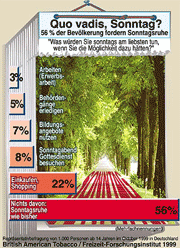Quo vadis, Sunday?
56 per cent of the population demand Sunday rest
Sunday is dear and sacred to Germans. The population clearly rejects all attempts to turn Sunday into a working day like any other: Shopping around the clock? Dealing with the authorities? Or even go to work? The overwhelming majority of the German population (56%) does not want any part of this. This is the result of a recent representative survey conducted by the Leisure Research Institute of British American Tobacco, in which 1,000 people aged 14 and over were asked about their attitude to Sundays and their regular Sunday activities.
"The Basic Law is alive and well," says Prof Dr Horst W. Opaschowski, Director of the Institute. "Because Sunday - designated in Article 140 of the Basic Law as a day of rest and spiritual upliftment - is actually practised as such by most German citizens." Three quarters of Germans regularly spend Sundays in or near their homes. Only 26 per cent of the population go on a Sunday outing every one to two weeks.
"Quiet, relaxing, simply beautiful..."
The personal significance of Sunday
The Leisure Research Institute of British American Tobacco provides evidence that Sunday in Germany has retained its personal significance as the quietest day of the week (1989: 41% - 1999: 38%), the most relaxing (1989: 43% - 1999: 34%) and the most beautiful day (1989: 38% - 1999: 30%) - albeit with a downward trend. A comparison over the last ten years shows that Sunday is losing its recreational value. And even the best day of the week does not always have to be Sunday. Opaschowski: "The consumer triad of shopping/cinema/eating out often takes place during the week or before the weekend." The study also shows that Sunday is increasingly losing its communal character. Only for around one in eight Germans is Sunday the most sociable day of the week (1999: 13% - in comparison 1989: 23%).
In the subjective experience of German citizens, Sunday remains an indispensable day of rest, a beautiful day - and just sometimes quite boring, not for pensioners (8%), but for young people: For one in five young people aged 14 to 24 (21%), Sunday is "the most boring day of the week." So Sunday has two faces: what the German Sunday soul calls "cosy", i.e. peace, harmony and security, also includes empty hours in individual cases, which young people can experience as boredom and old people as loneliness.
A culture of experience instead of Sunday worship?
Is Sunday worship being replaced by a culture of experience? The Sunday rituals of Germans speak a different language: almost one in five Germans (19%) is a regular churchgoer and attends a church service "at least twice a month". There are more than two churchgoers for every leisure park visitor (7%). Even visits to sporting events (12%) or public festivals (13%) are much less popular, not to mention discos (9%) or amusement arcades (2%).
Sundays, and Sunday shopping in particular, have become the talk of the town in recent months and have left their mark. When asked: "What would you most like to do on Sundays if you had the chance?", 22 per cent of the population answered "go shopping", with 14 to 24-year-olds (48%) being the most enthusiastic because shopping is a leisure experience for them. In contrast, 81 per cent of the population aged 25 and over are not interested in Sunday shopping. The discussion about Sunday shopping comes at least one generation too early.
Technical data of the representative survey
Number and representation of respondents:
Germany, 1,000 people aged 14 and over
Period of the survey:
12 to 18 October 1999



